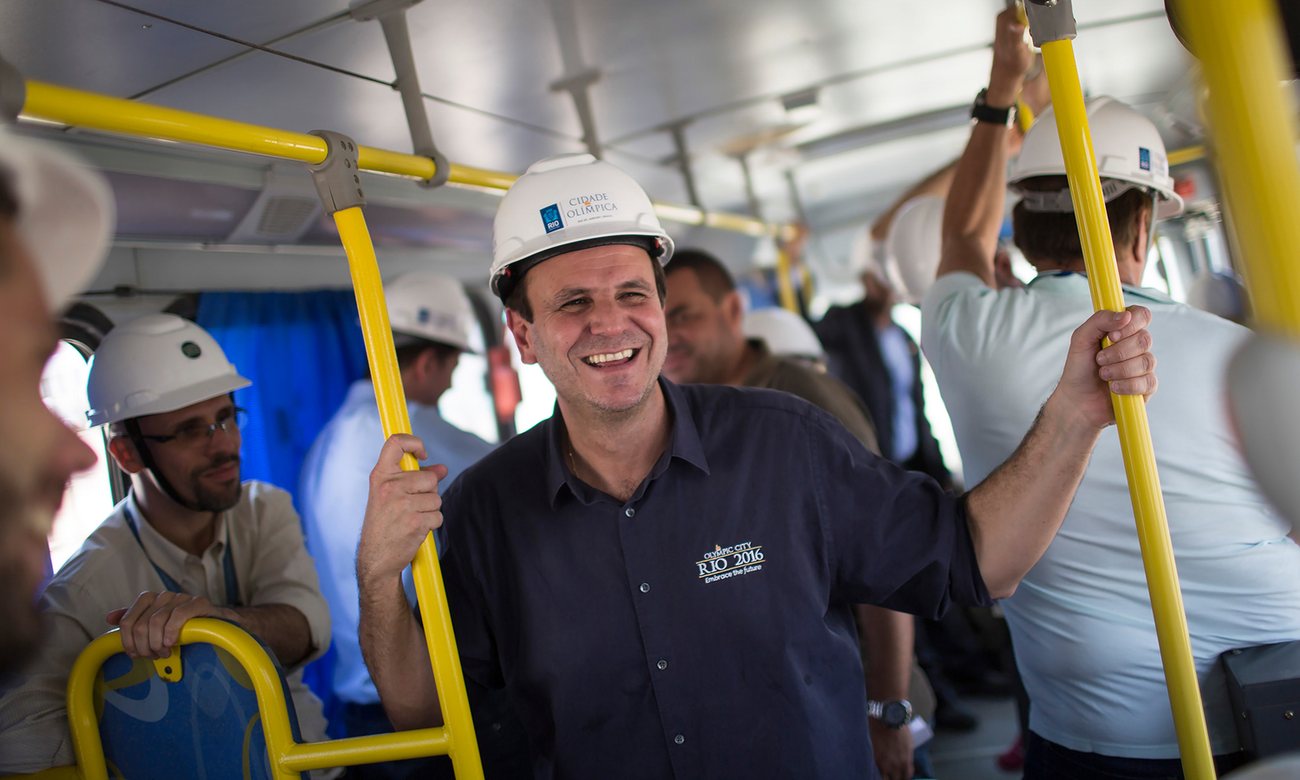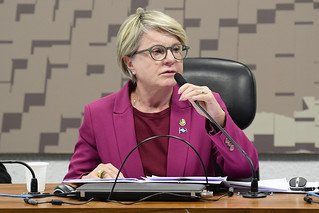[:pb]The mayor of Rio de Janeiro, Eduardo Paes, believes crisis-hit Brazil has missed the opportunity of the Olympic Games to showcase itself on the global stage – but in an interview with the Guardian, strongly denied that Rio’s billion-dollar Olympic investment has ignored the poorer parts of his city.
Every host city faces controversy in the build-up to the mega-event, but a combination of recession, security breakdowns, the Zika epidemic, the Brazil president’s impeachment, budget cuts, infrastructure delays, environmental scares and complaints about displacement and gentrification have inflicted serious damage on the images of both Brazil and Rio.
“This is a missed opportunity,” Paes acknowledged. “We are not showcasing ourselves. With all these economic and political crises, with all these scandals, it is not the best moment to be in the eyes of the world. This is bad.”
But he also believes the problems are exaggerated by the press in a way that unfairly portrays Rio to the outside world. “It makes me mad. If you read the international media, it seems like everything here is Zika and people shooting one another.”
By turns exasperated, combative and animated, the mayor defended the long-term impact of the global sporting circus that is about to descend on his city. “There has never been so much transformation for poor people [in Rio],” he said during a two-hour interview. “The Olympic Games are a great inspiration to get things done.”
The mayor – a political shape-shifter who has been in five different parties including the Greens, Labour and, currently, the centre-right Brazilian Democratic Movement Party of the interim president Michel Temer – also refuted allegations that his focus for Olympic investment has been only on the wealthier parts of the city.
“It’s crazy to say there is no investment in poor areas,” he said. “If people say this, they don’t know the geography [of the city].”

Critics claim the mayor is directing a disproportionate amount of Olympic funds towards the wealthy Barra da Tijuca region on the western side of the city, where Paes cut his political teeth.
This is where several of his campaign backers have major projects. One of them, Carlos Carvalho, told the Guardian last year he planned to make Barra the centre of Rio – even if it meant driving out the poor so a “noble” elite could move in.
The mayor has subsequently put pressure on the elderly property developer to stop talking to the media. “I don’t agree with him,” Paes now says. “I tell him that every time you say stupid things, be ready because I’ll be tough on you.”
Paes claims 75% of the city government’s overall investment goes into the poorer northern and western areas of Rio “because that is where I get my votes from”. The bulk of the 331 new schools and 90 new clinics are in these areas, he said, as are the majority of the new highways, which will reduce commuting times for people living in favelas who work in the wealthy southern zone of the city.
This is disputed by social activists and academics, who point out that most of the new roads and transport links take people to and from Barra. They argue Paes is aggressively promoting the gentrification of the city, even if it means forcing many people out of their homes.
The number of relocations is fiercely disputed. Leftwing critics claim the mayor has moved more than 50,000 people – a higher number than any of his predecessors. Paes says these are wildly exaggerated claims spread by his political rivals. He puts the number of relocations in the hundreds for directly Olympic-related projects, or the low thousands if the new rapid bus systems are included.
“Nobody likes to disappropriate people. It is expensive and messy. But sometimes we need to do it,” he said.

Rio is said to be spending 39.1bn reais (£9.1bn) on the Olympics, 58% of which is from private money. That includes R7.1bn to build all the stadiums (cheaper, the mayor boasts, than just one Olympic facility in London), R7.4bn on organising the event, and R24.6bn on legacy projects, such as the rapid bus system, light railway and new highways.
Advertisement
For him, it is a worthwhile cost to modernise the city. The main gain, he claims, is in transport. In 2009, only 18% of Rio’s residents used mass transit systems. Now, the figure is 63%. Largely for this reason, he believes historians will look back positively on the Olympics. “It’s a great project for the city,” he said.
But he admits it should have been better. There have been a series of mishaps – some tragic, others merely embarrassing, but all jumped on by the media. In April, two people died when a new coastal cycle path – one of the city’s Olympic legacy projects – crashed into the sea. Although it was built next to the Atlantic Ocean, the architects chosen by the city government had failed to foresee that it might be hit by a wave.
In June, a new light railway also suffered a temporary power failure just a week after it was inaugurated. It also emerged that the Olympic velodrome might not be completed on schedule, though it should still be ready in time for the Games. More doubtful is whether the metro extension – a key element in the transport plans for the Olympics – will be running in time. After repeated delays, it is now due to open just four days before the Games begin on 5 August.
Then there are longer-standing concerns about the pollution in Guanabara Bay, government funding shortfalls, and budget cuts that have prompted a police strike and a scaling back of plans to “pacify” Rio’s favelas.

Most of these problems, Paes says, are not the the fault of the city, but of the two higher tiers of government – at the state and federal level.
At the city level (stadiums, road transport and accommodation), the mayor insists preparations are going well. But at the state level (policing, water quality and subway construction), the governor has declared a financial state of emergencyand begged for federal help.
The federal government, meanwhile, is in a state of upheaval while the suspended Workers Party president Dilma Rousseff is being impeached by the Senate. She will be replaced at the Opening Ceremony by her running mate-turned-betrayer Temer. Underscoring the disruption, there have been three different sports ministers since March.
Even before this, Paes’s frustrations became evident in a leaked police recording of a phone call he made to the former president, Luiz Ignacio Lula da Silva. Amid a barrage of profanities, the transcript makes clear just how difficult the mayor found it to work with the state and federal leaders of the time.
Paes: “You have no idea how I’m suffering, sir. It’s fucked!”
Lula: “But with all the trouble, dear, you’re still blessed by God with these Olympics, you see, because others …”
Paes: “It’s true! True.”
Lula: “… The other mayors I talk to are fucked.”
The exchange highlights why Paes, ultimately, is so positive about hosting the Olympics, which have ensured preferential treatment and projects to keep Rio’s economy moving even in the midst of a deep recession.
“Things are happening because of the Olympics,” Paes said. “Even in a time of crisis we keep pushing. We are inaugurating things almost every week.”
He is confident the city will throw a good party during the Games – but does admit the hangover could be tough when the Olympic boom is over.
“We are not an island. The crisis is already hitting us,” acknowledged Paes, who will leave office later this year and move to the United States for six months, before a possible bid for the Rio state governorship. “But I think the economy can go up again. I believe in the future of this city, and the country.”
Follow Guardian Cities on Twitter and Facebook and join the discussion[:]







